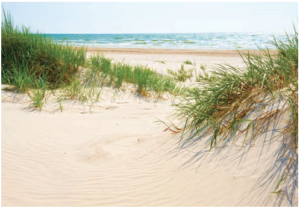
The U.S Army Corps of Engineers proposal to de-vegetate dunes in Smith Point County Park this fall to create better habitats for piping plovers has received pushback from local environmentalists.
The proposal, which was approved by a county committee on May 3, will allow the U.S Army Corps to spray glyphosate on 30 acres of dune vegetation. Spraying will kill vegetation, particularly non-native plants, in an effort to help piping plovers, a threatened shore bird that nests along Long Island beaches.Adrienne Esposito, executive director of the nonprofit Citizens Campaign for the Environment (CCE), who has described the Army Corps plan as appalling, argued that while everyone should work to help protect piping plovers from becoming extinct wants, “The Army Corps to understand the value of the dune system and give it equal weight in the value of protecting the species.”
“We don’t want to pit protecting our dune against piping plover protection. We are very confident a plan can be crafted to accomplish both critical goals,” said Esposito. “We spend all year trying to build up the beaches and build up the dunes and spraying glyphosate on the vegetation seems counterproductive.
”Atlantic piping plovers are currently on the threatened species list according to the U.S. Fish and Wildlife Service, whose primary objective is “Identifying, protecting, and restoring endangered and threatened species.” The U.S Fish and Wildlife Service’s website describes the ideal piping plover habitat as “wide, flat, open, sandy beaches with very little grass or other vegetation” backing the U.S. Army Corps of Engineers plan that de-vegetating the dunes will provide a stronger habitat for Piping Plovers.
Glyphosate is a non-selective herbicide that prevents plants from making certain proteins that are needed for plant growth. The National Pesticide Information Center website explains that glyphosate can also remain in soil for up to six months, depending on the climate and the type of soil it is in. According to Esposito, no research has been offered on whether the spraying may negatively affect other plants or animals.
The initial proposal from the U.S Army Corps of Engineers aimed to spray 173 acres of shoreline and dunes. Through negotiations with the county committee, only 30 acres in four locations where there are non-native plants were approved. Currently the county law says that pesticides are prohibited from being sprayed on county owned property without an exemption granted by this committee.
The U.S Army Corps of Engineers missed their April 1 deadline to spray this spring. Since each ruling is a one-year exemption from the county law, the U.S Army Corps of Engineers will have to reapply to spray next spring but are still able to spray this fall.
“I went and viewed the four areas that they proposed to de-vegetate and it was very appalling that they would want to spray on these properties,” said Esposito, who learned about the proposal because CCE is on the county committee. “Many of the areas had dense native vegetation. Many of the areas needed the vegetation in order to have a strong stable dune system,” Esposito added.
Urging beach goers to stay clear of fenced off piping plover habitats and to be respectful of the species, Esposito left her final thoughts. “We understand that piping plovers are an endangered and threatened species and we understand that they are a very fragile species and they need our assistance. However, we must look at these challenges holistically and we can’t solve one problem by creating another problem.”































